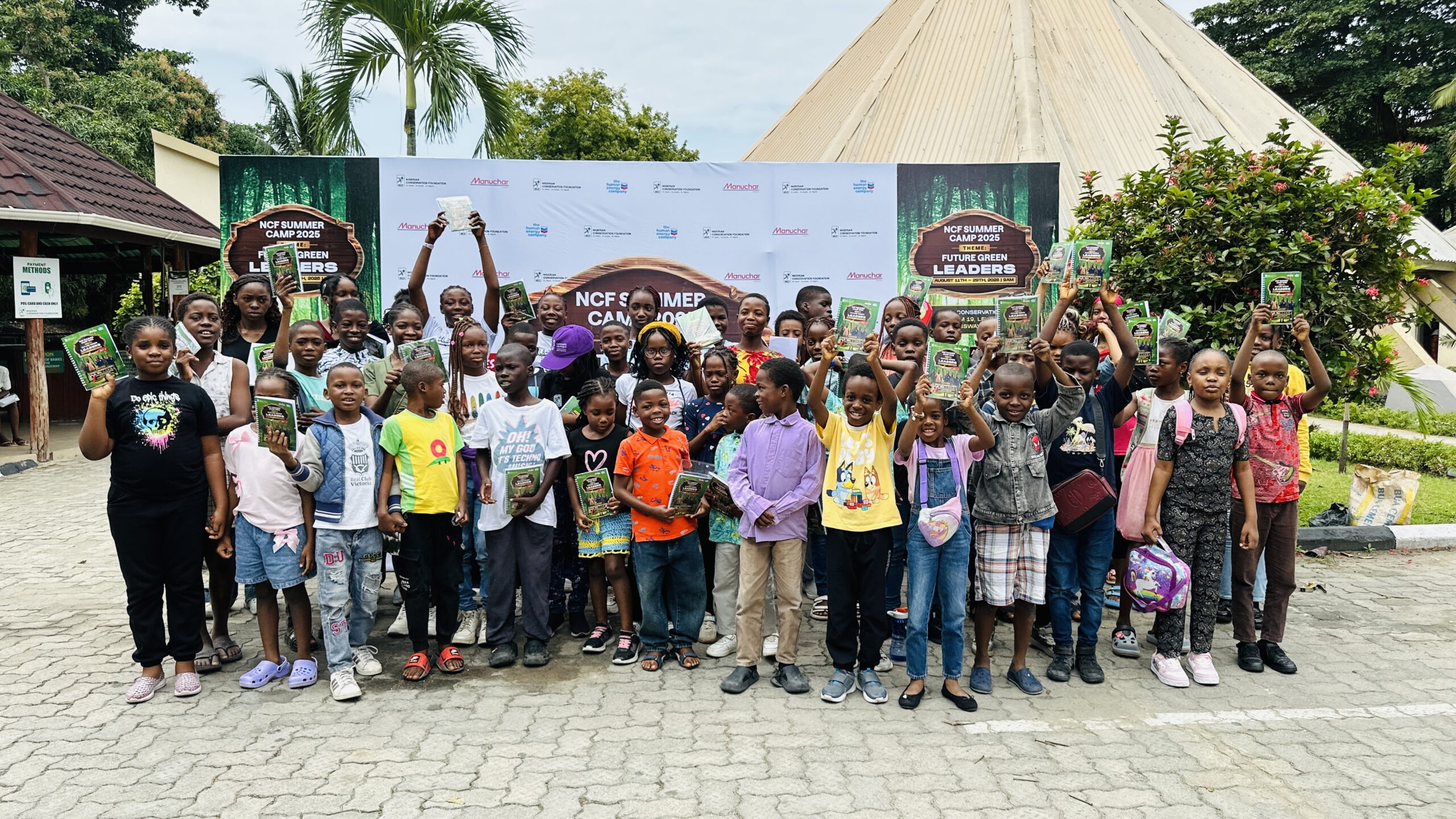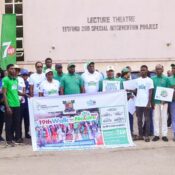
Future Green Leaders: Inside the NCF 2025 Summer Camp Programme
Every summer, the Nigerian Conservation Foundation (NCF), through a specially designed Summer Camp Programme, opens a new chapter in environmental education. One that blends fun, creativity, and practical learning to inspire tomorrow’s eco-champions. The 2025 edition of the NCF Summer Camp Programme, themed “Future Green Leaders,” lived up to that promise and more.
Held at the Lekki Conservation Centre (LCC) from August 11–29, 2025, and proudly supported by Chevron Nigeria Limited and Manuchar Nigeria, the three-week programme brought together over 100 students from various schools. The goal was simple yet profound: to nurture a generation of environmentally conscious young Nigerians through hands-on experiences that spark curiosity, responsibility, and innovation.

Nature-Themed Art: Painting the Planet Green
What better way to begin an eco-journey than through art? In the Nature-Themed Art sessions, children discovered how creativity can serve as a voice for the planet. They learned colour theory, created beautiful paintings inspired by forests, rivers, and wildlife, and used their art to advocate for a cleaner, greener world.

Beyond brushstrokes and colours, the sessions taught teamwork, problem-solving, and emotional expression, showing that art isn’t just beautiful but powerful.

Forest Adventure: Lessons from the Canopy
The excitement soared (literally) during the Forest Adventure at LCC’s famous 401-metre Canopy Walkway — the longest in Africa. Suspended 22.5 metres above the forest floor, the children experienced nature from an entirely new perspective.
As they admired the lush treetops, facilitators guided them through lessons on ecosystem balance, biodiversity, and forest conservation. The adventure helped to build courage, resilience, and appreciation for nature in them, proving that learning can also be thrilling.
“I enjoyed the experience on the canopy walk. Being so high among the trees was refreshing. I made new friends and would love to come next year.” – Annabel

Sustainable Upcycling: Turning Waste into Wonder
Waste became wealth in the Sustainable Upcycling sessions. Students learned to transform discarded materials from plastic spoons and fabric scraps to used tyres and bottles into functional art and furniture like ottomans and wall pieces.
This hands-on experience introduced them to the circular economy, showing how innovation and creativity can reduce waste and protect the environment. It also reinforced teamwork and resourcefulness, two key traits of future leaders.
“I learned about upcycling. How to use Ankara materials, plastics to make beautiful designs for our living rooms. It was mind blowing.” – Abigail.

Gardening: Growing Knowledge and Nature
One of the most loved activities of the summer programme was gardening. Using repurposed containers such as tyres, plastic bottles, and buckets, participants built small gardens and learned the basics of sustainable farming and composting.

They planted vegetables like Ewedu (Jute Mallow), Efo Tete (Amaranthus), Efo Soko (Lagos Spinach), and Tomatoes, learning about organic pest control and soil fertility along the way. The result? Brightly coloured tyre gardens that symbolized creativity, sustainability, and life.

Tree Planting: Planting Hope for the Future
Tree planting is a time-honoured NCF tradition, and this year was no different. Participants planted 10 seedlings across the LCC, including Paradise Plum (Chrysobalanus icaco), Black Plum (Prunus nigra), and Stool Wood (Alstonia boonei).
Each child dug, planted, and watered a tree, understanding firsthand how trees help reduce carbon emissions, improve air quality, and support biodiversity. More than a fun activity, it was a living symbol of commitment to a greener tomorrow.

Eco-Tech Workshop: Blending Innovation and Conservation
One of the most futuristic parts of the programme, the Eco-Tech Workshop, brought technology into the heart of conservation. Participants explored how digital tools can help protect the planet through four exciting modules:
- Drone Use for Environmental Monitoring – Students learned to operate drones safely and discovered how they’re used for wildlife tracking and habitat assessment.
- Bird Identification Apps – Using BirdLasser and binoculars, they identified local bird species and practiced real-world citizen science.
- GIS Mapping – Students retrieved their own geographical coordinates and plotted them on maps, learning how GIS supports biodiversity conservation.
- Environmental Campaign Design – Using Canva, they created digital campaigns to raise environmental awareness, blending art, technology, and activism.
“I loved the drone session. I learnt about the various parts of the drone, how to operate and fly it. I also enjoyed the green cooking because I love food.” – Olamide

Green Cooking: Tasting Sustainability
In the Green Cooking session, students discovered that sustainability can be delicious! They cooked using biofuel stoves and gel, eco-friendly alternatives to firewood and charcoal.
Together, they prepared local favourites like Zobo drink, Puff-puff, and Healthy Chinchin, while learning about renewable energy, nutrition, and environmental footprints. The shared meal at the end symbolized community, collaboration, and care for both people and planet.

Environmental Music & Closing Reflections
The final day was one of joy, reflection, and song. During the Environmental Music and Close-out Session, participants sang eco-themed songs, shared what they had learned, and heard inspiring messages from Manuchar Nigeria and an invited environmental activist.
From learning drone operation to painting forests, the students reflected on how their actions can make a difference. Many even suggested turning future editions into a full three-week camp. A testament to their enthusiasm and the programme’s success.
“This is my third year at the summer camp. I enjoyed the activities and how they are fun for every age bracket.” – Tammy.

Outcomes and Environmental Impact
By the end of the Future Green Leaders Summer Programme, the transformation was evident. Participants left with:
- Enhanced creativity through art and upcycling.
- STEM and tech-based conservation skills via drone, GIS, and digital campaign training.
- Practical agricultural knowledge through gardening and tree planting.
- Stronger eco-values that will ripple into their schools and communities.
The children didn’t just learn about the environment; they became active stewards of it.
Championing Environmental Education Through Creativity
The NCF 2025 Summer Programme proved that environmental education can be dynamic, creative, and life changing. Through art, adventure, technology, and teamwork, young Nigerians discovered their potential to lead the country toward a sustainable future.
As they return to their schools and homes, these Future Green Leaders carry with them not just memories, but the mindset and motivation to make lasting change one tree, one idea, and one act of kindness at a time. And we couldn’t have said it any better than Nathaniel, “NCF Summer camp 2025 was a blast.”



